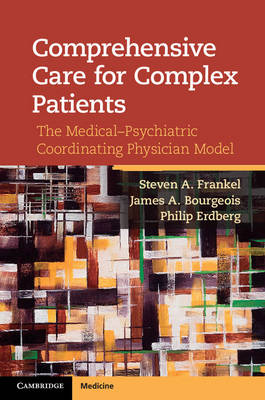
Comprehensive Care for Complex Patients
Cambridge University Press (Verlag)
978-1-107-02515-8 (ISBN)
'Complex patients' are a sizeable population who generally require disproportionate attention for their management and respond poorly to treatment. Their systemic medical, psychiatric and personal needs have a tendency to drain or exceed the capabilities of those who treat them whilst overutilizing health care resources. As this patient population grows, we move ever closer to a crisis in health care delivery. This volume presents an innovative team-based approach for assessing and managing diagnostically complex and management intensive patients. The physician-led 'Medical-Psychiatric Coordinating Physician (MPCP)' model not only improves patient treatment, but also provides for the containment of costs by reducing redundancy and curbing excess in the use of services. Other benefits include improved diagnostic accuracy and decision making, as well as better communication among physicians and allied health professionals. This book is essential reading for psychiatrists, primary care physicians, and physicians, directors and administrators working in multidisciplinary specialty clinics.
Steven A. Frankel, MD has practised and taught in the San Francisco Bay Area for over thirty-five years. He is certified by the American Board of Psychiatry and Neurology in general psychiatry as well as child and adolescent psychiatry, and has authored many professional articles and five books. His Collaborative Psychiatry Method of treatment for non-psychiatrists and psychiatrists alike, is elaborated in Evidence from Within: A Paradigm for Clinical Practice (2008), Making Psychotherapy Work: Collaborating Effectively with your Patient (2007), Hidden Faults: Recognizing and Resolving Therapeutic Disjunctions (2000) and Intricate Engagements: The Collaborative Basis of Therapeutic Change (1995, 2004). Comprehensive Care for Complex Patients: The Medical-Psychiatric Coordinating Physician Model, by Frankel, Bourgeois and Erdberg, dramatically expands the scope of his clinical model, placing a physician in the leadership position of treatment teams. A graduate of Yale Medical School, he was a National Institute of Mental Health research fellow in pharmacology at Stanford University Medical School. He then trained in psychiatry at the University of California Mount Zion Hospital and Medical Center in San Francisco, where he later joined the academic faculty. Dr Frankel then received psychoanalytic training at the San Francisco Psychoanalytic Institute, where he is a member of its faculty. He is an associate clinical professor at the University of California Medical School in San Francisco. He has been designated a Distinguished Fellow of the American Psychiatric Association, has attained certification by the American Psychoanalytic Association, and has been voted by his peers to Best Doctors in America® every year since 1987. James A. Bourgeois, OD, MD is Professor and Vice Chair, Department of Psychiatry and Behavioural Neurosciences, Michael G. DeGroote School of Medicine, Faculty of Health Sciences, McMaster University, Hamilton, Ontario, Canada. He has focused his clinical and academic work on psychosomatic medicine for over 15 years. Philip Erdberg, PhD is Assistant Clinical Professor at the University of California, San Francisco, School of Medicine, USA. He is Director of Research and Assessment at the San Francisco based Masonic Center for Youth and Families.
Preface; Forewords James Rundell, Roger Kathol, and Wolfgang Soellner; Part I. Introduction: 1. Clinical complexity: the evolving place for a medical-psychiatric coordinating physician; 2. Beyond the physician-patient model: the value of a treatment team for dealing with clinical complexity; Part II. Guidance for Negotiating Clinical Complexity: 3. Sorting out clinical complexity: medical and psychometric testing; 4. The limitations of algorithms: details of two clinically complex treatments; 5. Negotiating the subjectivity and inter-subjectivity of the clinical field: the complexity inherent in clinical work; Part III. Clinical Decisions and their Execution: Accuracy Within Complexity: 6. The intersection of data and clinical judgment: the place of subjectivity in treatment decisions; 7. Clinical strategy: grappling with treatment complexity; 8. Working consensus: the importance of physician-patient collaboration; 9. Linking truing measures: technical and interpersonal precision in work with complex cases; Part IV. The Application of the Model: The Medical-Psychiatric Coordinating Physician: 10. Managing complex treatments: the medical-psychiatric coordinating physician; 11. The medical-psychiatric coordinating physician model: its components, costs, and future; Bibliography; Index.
| Erscheint lt. Verlag | 18.10.2012 |
|---|---|
| Verlagsort | Cambridge |
| Sprache | englisch |
| Maße | 159 x 241 mm |
| Gewicht | 450 g |
| Themenwelt | Geisteswissenschaften ► Psychologie ► Klinische Psychologie |
| Medizin / Pharmazie ► Gesundheitsfachberufe ► Logopädie | |
| Medizin / Pharmazie ► Gesundheitswesen | |
| Medizin / Pharmazie ► Medizinische Fachgebiete ► Psychiatrie / Psychotherapie | |
| Medizin / Pharmazie ► Medizinische Fachgebiete ► Suchtkrankheiten | |
| ISBN-10 | 1-107-02515-X / 110702515X |
| ISBN-13 | 978-1-107-02515-8 / 9781107025158 |
| Zustand | Neuware |
| Haben Sie eine Frage zum Produkt? |
aus dem Bereich


